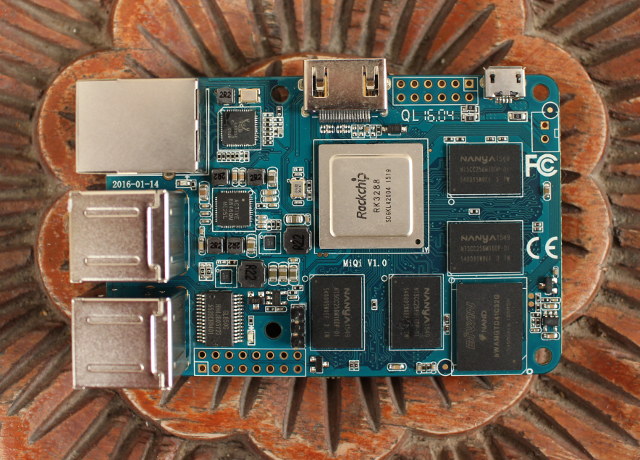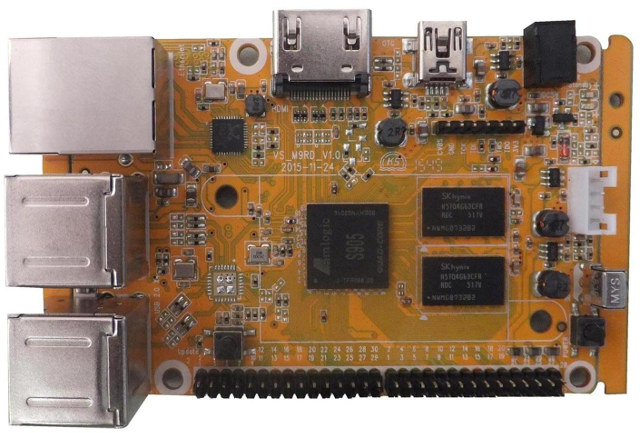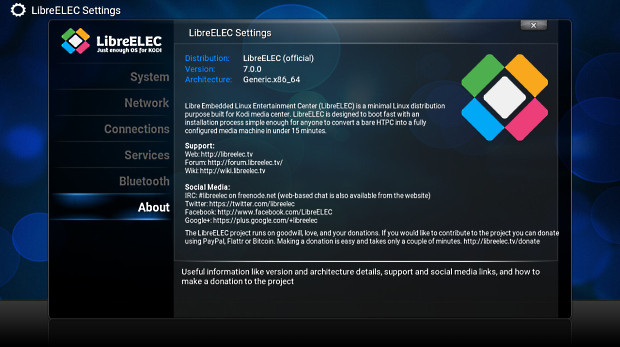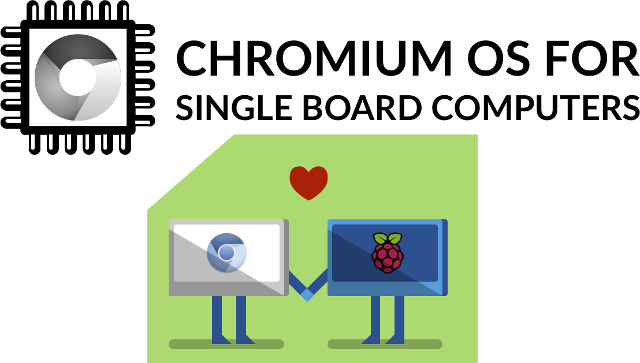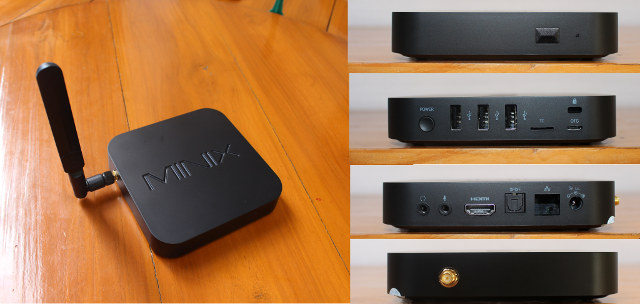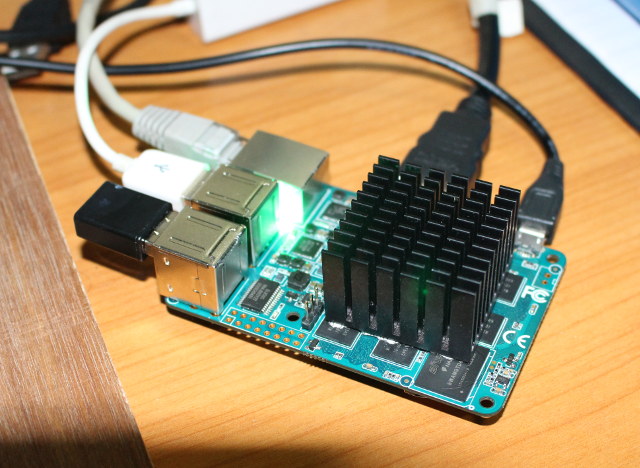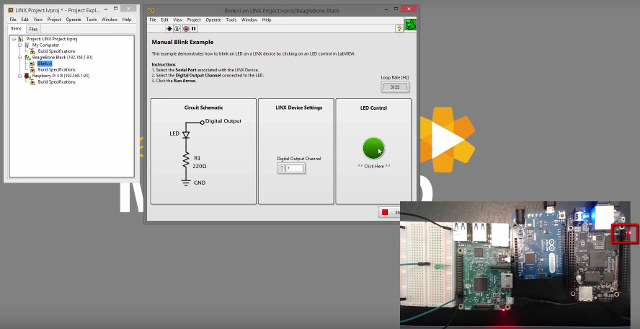Linus Torvalds released Linux Kernel 4.6 earlier today: It’s just as well I didn’t cut the rc cycle short, since the last week ended up getting a few more fixes than expected, but nothing in there feels all that odd or out of line. So 4.6 is out there at the normal schedule, and that obviously also means that I’ll start doing merge window pull requests for 4.7 starting tomorrow. Since rc7, there’s been small noise all over, with driver fixes being the bulk of it, but there is minor noise all over (perf tooling, networking, filesystems, documentation, some small arch fixes..) The appended shortlog will give you a feel for what’s been going on during the last week. The 4.6 kernel on the whole was a fairly big release – more commits than we’ve had in a while. But it all felt fairly calm despite that. Linux 4.5 added […]
MiQi Dual Boot Android & Ubuntu Development Board Crowdfunding Campaign Has Launched
MiQi is a development board using a form factor similar to Raspberry Pi boards, but based on a more powerful Rockchip RK3288 Cortex A17 processor combined with 1 or 2 GB. I had the change to test an early sample pre-loaded with a dual boot image with Android 5.1 and Lubuntu 14.04, and found it to be one the fastest sub $100 development board in Linux, behind Hardkernel ODROID-XU4, as well as better CPU & GPU performance compared to recent Android TV boxes based on Amlogic S905, Rockchip RK3368, and so on. MQMaker has now launched a flexible funding crowdfunding campaign on Indiegogo to raise funds for mass production. Let’s remind us of MiQi hardware specifications first: SoC – Rockchip 3288 quad core ARM Cortex A17 up to 1.8 GHz with Mali-T764 GPU supporting OpenGL ES 1.1/2.0 /3.0, and OpenCL 1.1 System Memory – 1 or 2G DDR3 depending on model Storage – 8 or 32 […]
VideoStrong VS-M9RD Development Board is a Raspberry Pi Lookalike with Amlogic S905 SoC
VideoStrong is better known for their Android TV boxes with or without digital TV tuners, such as K1 Plus T2/S2 TV box, but the company has also designed several Amlogic based single board computers and development boards, including the latest Raspberry Pi inspired VS-M9RD board powered by Amlogic S905 quad core 64-bit ARM processor. VS-M9RD board technical specifications: SoC – Amlogic S905 quad core cortex-A53 processor @ 2.0 GHz with penta-core Mali-450 GPU up to 750 MHz System Memory – 1GB DDR3 SDRAM Storage – Optional 4 to 32 GB eMMC flash module, micro SD card slot Video Output – HDMI 2.0 up to 4K2K Connectivity – Gigabit Ethernet USB – 4x USB 2.0 host ports + mini USB OTG port Expansion Header 30-pin header 28-pin header 7-pin header with CVBS and JTAG signals Debugging – 4-pin 2.54mm pitch serial console header Misc – IR receiver, power and update buttons. […]
LibreELEC (OpenELEC Fork) v7.0.0 Released with Kodi 16.1
It’s not always easy to get along in life, and recently this has been true in Kodi developer community and related project, with Koying leaving his role as the main Kodi Android developer, possibly meaning Kodi 17 won’t get an Android port, and more recently several OpenELEC developers, not satisfied with some of the current project developments, decided to fork it, and create LibreELEC. The team of 25 or so members has now released LibreELEC v7.0.0 based on Kodi 16.1 which had also been released a few days ago. The changelog only reads: The 7.0.0 release contains Kodi Jarvis 16.1 (final) and a fix for Verisign SSL certificate changes that impacted Pandora add-on users. It also addresses a bluez crash, a firmware update for Intel Skylake users, and a fix for an Amlogic CEC issue on WeTek Play/Core. Most importantly it also contains our new logo branding. The images are […]
Chromium OS for SBC Aims to Turn Popular Development Boards into Chromeboxes
A team of developer has come together last December in order to provide Chromium OS, the open source project which Chrome OS is based on, to single board computers such as Raspberry Pi boards. So far, they’ve provided Chromium OS images for Raspberry Pi 2 & 3, but more boards should be supported in the future. The latest version 0.5 release is said to be usable, but WiFi, Netflix, and HTML5 video are not working. The installation procedure is standard. You simply need to download and uncompress the archive (e.g. SamKinison_v0.5_Pi3_16GB.tar.xz), and dump it on a micro SD card with Win32DiskImage or dd. They have released different images for Raspberry Pi 2 & 3, and different SD card sizes (2GB and 16GB). Chromium OS is using 12 partitions, so that may be why they don’t provide a single image and resize the file system during the first time. You can […]
What’s the Best Android TV Box?
[Update December 26, 2017: I’ve posted a new version of this post entitled “What’s the Best Android TV Box (2017/2018 Edition)?“. I’ll leave the post below to have an historical perspective] I often get asked which TV box to buy, or what the best Android TV box is, and the answer is the TV box that fits your needs for the lowest price point possible. Considering there are around 2 millions apps for Android, they are multitudes of use cases, and you can’t provide a single answer for everybody. So I’ll provide a list of things to look for beside the processor, and three TV boxes that I think are worth considering, before providing alternatives for people who want cheaper devices. Things to Look for There are still a few things you may want to specifically look for before purchasing an Android TV box: History of regular firmware updates – […]
Android and Linux Benchmarks on MiQi Development Board
MiQi is an upcoming low cost development board powered by Rockchip RK3288 SoC that will sell for $35 with 1GB RAM and 8GB storage, and $69 for the version with a 2GB / 32GB combination. Since Rockchip RK3288 was launched in 2014, most available benchmarks were made on Android 4.4, and since MiQi is the first low cost board based on the processor, other RK3288 based board such as FireFly have not been that popular. So I’ve decided to run updated benchmarks in MiQi both in Android 5.1 and Linux (Lubuntu 14.04), which was easy since a dual boot image is pre-installed. But since I received an early sample without heatsink, I found a spare heatsink added some thermal paste and placed it on top of the processor and partially on RAM and eMMC flash. MiQi Board Android 5.1 Benchmarks I ran Antutu both using 1080p60 and 2160p30 video output, […]
LabVIEW Now Supports Raspberry Pi 2 & 3, BeagleBone Black with LINX 3.0 Release
LabView is a system-design platform and development environment with a graphical programming syntax that “makes it simple to visualize, create, and code engineering systems”. It’s often used with National Instruments hardware such as myRIO, but LabView Makerclub has also developed LINX to bring support to Arduino and chipKIT, and with the latest LINX 3.0, support for BeagleBone Black, and Raspberry Pi boards has been added. You’ll need Labview 2014 (Windows only) or greater to work with LINX 3.0, as well as one of the supported development boards. Complete Labview 2014 + board kits are also sold with the BeagleBone Black Physical Computing Kit and Raspberry Pi 2 Physical Computing Kit both going for $89 on Digilent. LabView files are save in VI format, and the same file can be used on Arduino, BeagleBone Black, and Raspberry Pi board with minor modifications (e.g. GPIO pin number) as shown in the blink […]



